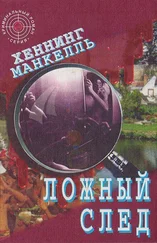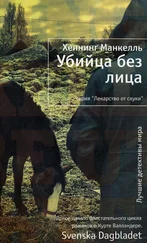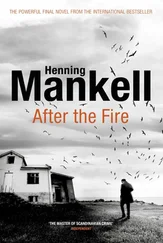Then there was a new sound. The sound of sirens rapidly approaching. Someone heard that first shot , he thought. There are plenty of police out on the roads right now. He hurried down to the entrance. Now he had a leg up on his opponent, and that feeling was transforming his fear to rage. He had just been shot at for the second time in the space of a few days. But he also tried to think clearly. The Mercedes van was still there, and there was only one way out of the parking lot. If the man chose to take the car, it would be easy to get him. If he fled on foot it would be much harder.
Wallander reached the entrance and ran down along the road. The sirens were close now, signaling one, maybe even two or three, patrol cars. Hansson was in the first car. Wallander had never been so happy to see him.
“What’s happening here?” Hansson shouted. “We got a report of a gunshot in the area. And Höglund said you had gone down here.”
Wallander tried to explain what had happened as quickly as he could.
“No one goes down there without the proper protection,” he finished. “We also need dogs. But first we have to be prepared for the possibility that he tries to shoot his way out.”
They quickly erected a barrier and started putting on their vests and helmets. Höglund arrived, closely followed by Martinsson.
“The fog is about to lift,” Martinsson said. “I’ve talked to the National Weather Service. It’s very localized.”
They waited. It was now one o’clock on Saturday, the eighteenth of October. Wallander had borrowed Hansson’s phone and gone off to one side. He dialed Elvira’s number but changed his mind and hung up before she answered.
The fog didn’t lift until half past one. But then it disappeared quickly. It was gone in a matter of minutes and the sun came out. They saw the parked van and Martinsson’s car. No one was around. Wallander walked over and found his phone.
“He must have taken off on foot,” he said. “He abandoned the van.” Hansson called Nyberg, who promised to come as quickly as possible. They searched the car but found nothing that told them anything about its driver.
“Did you catch sight of him at all?”
Höglund was the one who asked the question. It irritated Wallander and made him defensive.
“No,” he said. “I didn’t see him. You wouldn’t have been able to, either.”
She was taken aback.
“It was just a question,” she said sourly.
We’re all tired, Wallander thought. She and I both. Not to mention Nyberg. Martinsson might be the exception, since he had the energy to sneak around the police station and talk behind people’s backs.
Two canine units had been dispatched and were now searching the area. They immediately picked up a scent that led down toward the water. Nyberg arrived with his forensic technicians.
“I want fingerprints,” Wallander said. “That’s the main thing. I want to know if anything matches what we found at Apelbergsgatan or Runnerström Square. Or the power substation and Sonja Hökberg’s purse. And don’t forget Siv Eriksson’s apartment.”
Nyberg took a quick look into the van.
“I’m so grateful every time I’m called out to look at something that doesn’t involve mutilated bodies,” he said. “Or so much blood that I have to put on waders.”
Robert Modin was still missing without a trace. The canine units came back at three. They had lost the track some distance up the coast.
“Everyone looking for Robert Modin should also be keeping an eye out for a man with an Asian appearance,” Wallander said. “But it’s important that he not be directly approached. This man is armed and dangerous. He’s been unlucky twice, but don’t count on a third time. We should also remain alert to incoming reports of stolen cars.”
Wallander gathered the members of his closest team. The sun was shining and there was no wind. He led them to the meditation garden.
“Were there any police during the bronze age?” Hansson asked.
“Probably,” Wallander said. “But I doubt there was a justice department breathing down their necks.”
“They played horns,” Martinsson said. “I was at a concert recently at the Ale stone formation. They had tried to re-create prehistoric music. It sounded like foghorns.”
“Let’s try to focus on the situation at hand,” Wallander said. “Further discussion of the bronze age will have to wait. Robert Modin receives a threat on his computer and he flees. He has now been gone for about five or six hours. Somewhere out here is a person who is looking for him, but we can also assume this person is after me. This will naturally come to extend to all of you.”
He looked around at them.
“We need to ask ourselves why,” he continued, “and I can only find one reasonable explanation. He, or someone, is worried that we know something. And even worse, this person — or persons — is worried that we’re in a position to prevent something from occurring. I’m completely convinced that everything that has happened has been a result of Falk’s death, and has to do with whatever is in his computer.”
He paused and looked at Martinsson.
“How’s Alfredsson doing?”
“I last spoke to him over two hours ago. At that point he could only tell us what Modin told us — that there is some kind of ticking time bomb built into the program. Something is going to happen. He was going to apply various probability calculations and reduction programs to see if he could isolate some kind of pattern. He is also in contact with Interpol cybercrime experts to see if any other countries have experience with this kind of thing. I have the impression that he’s thorough and knows what he’s doing.”
“Then we’ll leave it in his hands,” Wallander said.
“But what if something is really going to happen on the twentieth? That’s on Monday. It’s less than thirty-four hours away,” Höglund said.
“Quite honestly, I don’t know what to tell you,” Wallander said. “But we know it must be something important, since these people are prepared to commit murder.”
“Could it be anything other than an act of terrorism?” Hansson asked. “Shouldn’t we have contacted the National Guards a long time ago?”
Hansson’s suggestion was met with hearty laughter. Neither Wallander nor any of his colleagues had the slightest confidence in the Swedish National Guards. But Hansson had a point, and Wallander should already have thought of it, since he was leading the investigation. His head was the one on the block, and it would roll if a situation developed in which the National Guards could have played a role in preventing what happened.
“Call them,” Wallander told Hansson. “If they actually stay open for business during the weekend.”
“What about the blackout?” Martinsson said. “It seems that whoever is behind this has developed a sophisticated knowledge of power stations. Could there be a plot to knock out the power grid?”
“We can’t rule anything out,” Wallander answered. “But that makes me think of the blueprint we found in Falk’s office. Do we know how it got there?”
“According to Sydkraft, the original was in Falk’s office and a copy had been left in its place in their files,” Höglund said. “They gave me a list of people who would have had access to these files. I gave it to Martinsson.”
Martinsson made an embarrassed gesture.
“I haven’t had time,” he said. “I’ll feed it through our registers as soon as I get a chance.”
“That is now a priority,” Wallander said. “It may give us something.”
A soft wind had started blowing cold air over the fields. They talked a moment longer about the most important tasks at hand, and then Wallander delegated them. Martinsson was the first to leave. He was going to bring Modin’s computers to the station, as well as cross-check the names that Sydkraft had sent them. Wallander put Hansson in charge of the search for Modin. Wallander felt a need to talk through the situation with someone, in this case Höglund. Ordinarily he would have chosen Martinsson, but now that was unthinkable.
Читать дальше












